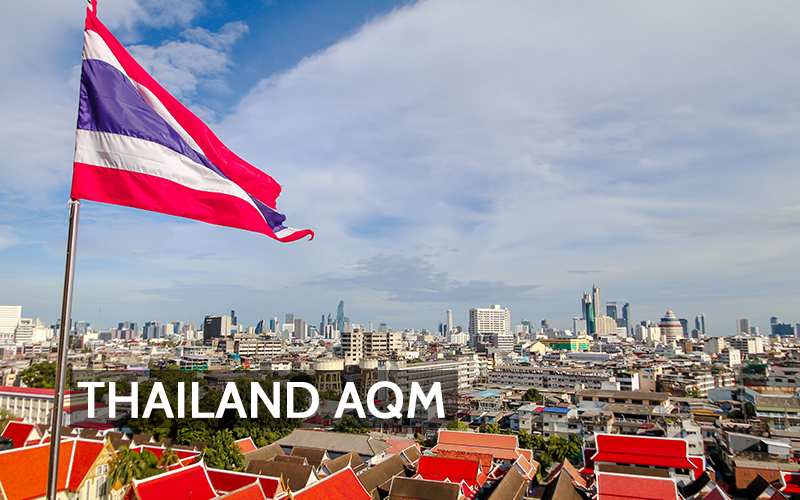Thailand has grappled with air pollution challenges in urban centers like Bangkok and Chiang Mai. In response, the Thai government has implemented a series of regulations and initiatives aimed at monitoring and improving air quality. This article examines the evolution of these regulations, their implementation, and prospects for future air quality management across the country.
Historical Development of Air Quality Regulations
The foundation of Thailand’s air quality management is the Enhancement and Conservation of National Environmental Quality Act, B.E. 2535 (1992). This act established environmental standards for ambient air quality and set emission limits for both mobile and stationary sources, such as vehicles and industrial facilities. It also designated the Pollution Control Department (PCD) as the primary agency responsible for monitoring and controlling air pollution.
In 1992, the Factory Act was enacted to regulate industrial emissions, mandating that factories comply with specific air emission standards to minimize pollutants released into the atmosphere. Additionally, the Industrial Estate Authority of Thailand Act, B.E. 2522 (1979), set effluent standards for factories within industrial estates, further controlling pollution levels.
Implementation and Enforcement Challenges
Despite these legislative measures, enforcement has faced challenges. A 2021 review by the Stockholm Environment Institute showed that while various plans and acts exist to control air quality, measures have often been reactive, with significant gaps in enforcement. This has resulted in persistent air quality issues, particularly concerning particulate matter (PM2.5) levels, which have frequently exceeded safe thresholds.
Recent Developments and Future Prospects
Recognizing the need for more robust action, the Thai government has taken steps toward strengthening air quality management. On November 28, 2023, the Cabinet approved in principle the Draft Management for Clean Air Act, commonly referred to as the “Clean Air Bill.” Proposed by the Ministry of Natural Resources and the Environment (MONRE), this legislation aims to establish comprehensive measures to manage and control activities that generate air pollution, including emissions from factories, open burning, vehicles, and transboundary sources.
The Clean Air Bill proposes the establishment of the Management Committee for Clean Air, empowered to set standards and indices for clean air quality and to control pollution sources. The Pollution Control Department would be mandated to monitor air quality and prepare annual reports at national, regional, and provincial levels. This legislative move reflects a proactive approach, aiming to address air pollution through structured and enforceable measures.
In addition to legislative efforts, Thailand plans to introduce a carbon tax to reduce carbon emissions. Deputy Finance Minister Paopoom Rojanasakul announced in September 2024 that the tax would be calculated based on the carbon content of products, signaling a commitment to integrating economic tools into environmental policy.
Furthermore, the government has set ambitious targets to promote electric vehicle (EV) adoption, aiming for 30% of automobiles produced by 2030 to be electric. This initiative is part of a broader strategy to reduce emissions from the transportation sector, a significant contributor to urban air pollution.
Challenges and Considerations
Despite these advancements, challenges remain. Seasonal factors, such as agricultural burning, contribute to air pollution, particularly in northern regions. Traditional practices, like crop residue burning, are deeply rooted in local cultures and present enforcement challenges. Addressing these issues requires not only regulatory measures but also community engagement and the promotion of alternative practices.
Transboundary pollution is another concern, with pollutants from neighboring countries affecting Thailand’s air quality. This necessitates regional cooperation and the development of joint strategies to effectively tackle cross-border air pollution.
Thailand’s journey toward effective air quality management has evolved from foundational legislation in the early 1990s to more comprehensive and proactive measures in recent years. The approval of the Clean Air Bill and initiatives like the proposed carbon tax and promotion of electric vehicles indicate a strong commitment to improving air quality. However, successful implementation will require more robust enforcement, public participation, and regional collaboration to overcome persistent challenges and ensure a healthier environment for all Thais.
Related Articles:
From Policy to Practice: The Evolution and Future of Air Quality Management in Pakistan
References:
- https://enviliance.com/regions/southeast-asia/th/th-air
- https://www.sei.org/publications/regulating-air-quality-in-thailand-a-review-of-policies/
- https://www.globalcompliancenews.com/2024/01/22/https-insightplus-bakermckenzie-com-bm-environment-climate-change_1-thailand-bringing-back-clean-air-to-thailand-a-new-legislation-for-air-quality-management-approved-by-the-cabinet_01042024/
- https://www.reuters.com/world/asia-pacific/thailand-plans-introduce-carbon-tax-official-says-2024-09-26/
- https://en.wikipedia.org/wiki/Plug-in_electric_vehicles_in_Thailand
- https://apnews.com/article/4e0b144de1fcc36ba863d5f2ca588e5e


